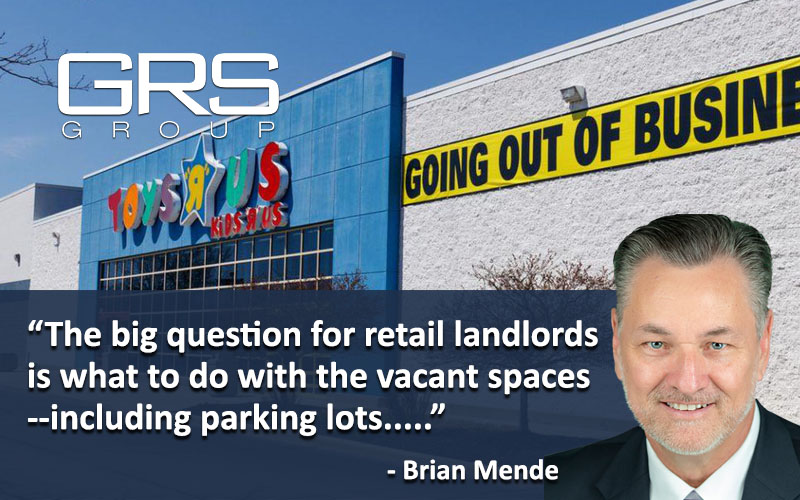Brian Mende, CPG is a director at GRS Group. He can be reached at 845.786.9092 or via email at [email protected]
Store closings are already a hot retail real estate topic for 2019.
I had some time to kill recently and decided to take a stroll through a regional mall near where I live. The changes underway are amazing. Former anchor stores are closed and the transformations have begun. The situations at these regional malls will continue throughout 2019 and beyond. Gap, J.C. Penney and Victoria’s Secret all recently announced that they are closing a combined 300 stores. Tesla also said it’s closing most of its stores, though the jury still seems to be out on that. Overall, Business Insider has counted about 4,000 total closures planned for the year.
The big question for retail real estate landlords is what to do with the vacant spaces. There are some concepts expanding, such as dollar and convenience stores, that can ease some of the pain.
Additionally, there are plenty of great ideas out there for repurposing malls and other retail centers, which involve adding health clinics, restaurants, fitness centers and entertainment venues, including indoor racing tracks, bowling alleys and gaming centers. In some cases, these concepts are keeping some properties alive.
Other than the actual shopping center, though, landlords can develop the surrounding land, namely their parking lots. Since so many stores are shutting their doors, the need for a heavy parking requirement is often negated, freeing up space for property owners to pursue other types of ROI.
One concept some firms are exploring is self-storage. For example, the City of Yonkers, in New York, has changed zoning laws to allow for storage facilities to be placed in retail-concentrated areas. Self-storage owners are attracted to blighted retail-center lots for several reasons. They are normally in visible areas, have pre-flattened surfaces and construction of these facilities on existing commercial real estate property is less costly because many facets of development have already been completed.
There is also a major need for affordable-housing units across the country, and retail parking lots could create a great opportunity to fill that gap. Apartments and other types of housing are already going up on the grounds around shopping centers in Southern California. In most cases, the centers are keeping a bit of retail, while the residential is added, creating an environment with a built-in customer base for stores. Self-storage could do much of the same, as people often return to units to drop off and pick up household items.
The largest retailer in the world is also taking part in this trend without closing stores. Walmart has announced it will build Town Center environments in the parking lots of some of its Supercenters, which are often vast. These could include outparcel restaurants, urgent-care clinics and apartments.
If a busy Walmart can add uses in its parking lot, then owners of shopping centers with closing stores have room to do the same.
About GRS Group
GRS Group is a leading provider of commercial real estate (“CRE”) services worldwide. With offices across the United States, Europe, and affiliates around the globe, GRS Group provides local market knowledge with a global perspective for institutional real estate investors, occupiers and lenders worldwide. The GRS Group team has evaluated and advised on over $1 trillion in CRE transactions.
Through the company’s proprietary management process, Global Services Connection, GRS Group delivers an integrated suite of services including Financial Advisory, Transaction Management, Assessment and Title Insurance. We provide a single point of contact, capable of leveraging the GRS Group portfolio of companies and delivering customized solutions to assist our clients in achieving their investment goals.

